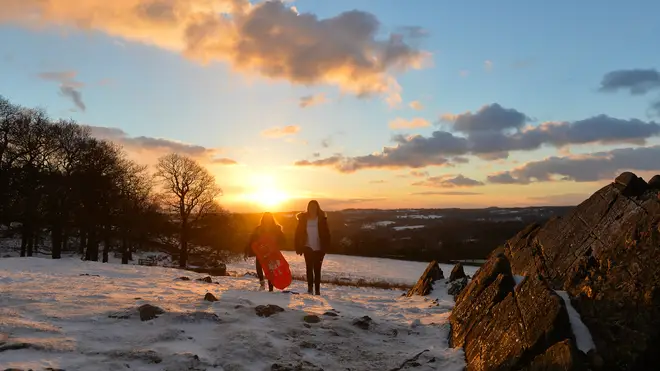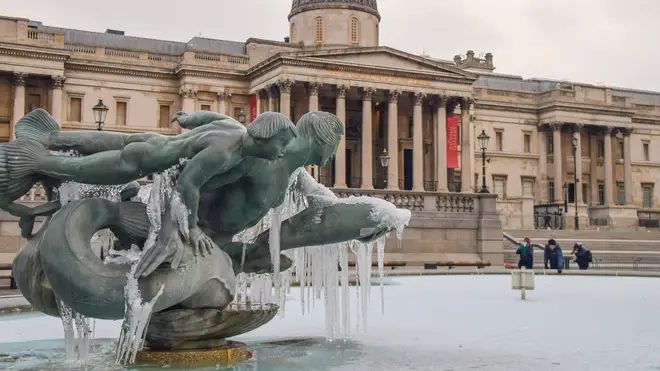
Ali Miraj 12pm - 3pm
13 February 2021, 13:03

Temperatures are set to hit double figures next week after Britain endured a record-breaking "extreme freeze" cold snap.
Despite milder conditions sweeping in from Monday, the wintry weather will stick around for the rest of the weekend.
Forecasters have predicted that the mercury will soar as high as 12C next week, just days after numerous records were broken across the UK when thermometers plummeted into the minus 20s in some parts.
Yellow weather warnings for snow and ice will remain in place across most of Scotland, parts of northern England, Wales and Northern Ireland on Saturday and Sunday.
Blizzards are expected to blast Northern Ireland on Saturday, with bitter gusts reaching 40mph in coastal areas.
Met Office forecaster Luke Miall said: "Blizzard conditions will really significantly reduce visibility when driving. We have gusts in the region of 35mph to 40mph on the coast and nearly 30mph inland."
Read more: 'Extreme freeze' as temperatures plummet to -22.9C
Read more: Record cold snap continued on Friday with new lows across UK

Blizzards in Scotland causes chaos on slippy roads
On Friday night, Loch Glascarnoch, near Garve in northern Scotland, recorded the lowest temperature in the UK at -6.5C
The mercury dropped to -5.8C overnight at Pennerley in Shropshire, -5.6C at Parc Bryn Bach in Tredegar, South Wales, and -1.7C in Killylane, Co Antrim, Northern Ireland.
Chief meteorologist at the Met Office, Neil Armstrong, said: "For the past week the UK has been in a very cold airmass with temperatures well below average, this will change through the weekend as milder air moves in from the Atlantic and pushes that cold air mass out into the North Sea.
"Where temperatures were close to freezing in many places last week, we could expect to see 11C or 12C next week.
"There are still some wintry hazards to get through over the next few days, with low temperatures, strong winds and further snow especially in Northern Ireland."
Read more: UK lion cub freezes to death after crawling into sub-zero temperatures
Read more: Several vaccine centres closed as Storm Darcy brings -17C freeze

He added: "On Sunday there is a risk of freezing rain over the high ground in Scotland and northern England, with further snow in the Scottish hills, before turning to rain as the warm air takes hold."
On Wednesday night, the UK recorded its coldest temperature for 65 years at Braemar, Aberdeenshire, when the mercury dropped down to -23C during the "extreme freeze".
A record low for February was also recorded in England and Wales when temperatures in Ravensworth, North Yorkshire, dropped to -15.3C overnight on Thursday.
The chilly conditions froze Trafalgar Square's fountains and brought large amounts of snowfall to regions across the country.
Parts of the Thames also froze over in south London, with the RNLI sharing an image of the ice in Teddington.
Looks like we might need to send one of our rescue hovercraft to @rnli_teddington! 👀 https://t.co/XoYWkfNdus
— RNLI (@RNLI) February 12, 2021
Public Health England (PHE) has extended its cold weather alert through the weekend and has urged people to check on vulnerable relatives and neighbours.
Dr Owen Landeg, group leader for extreme events and health protection at PHE, said: "Cold weather can have a serious impact on health, particularly for older people and those with heart and lung problems, as it increases the risks of heart attacks, strokes and chest infections.
"Make a call, or socially-distanced doorstep visit if they live close by, to remind them to heat their home to at least 18C, 64.4F, and to keep up to date with the forecast.
"It's also helpful to check they have enough food and drinks and any medicines they need."